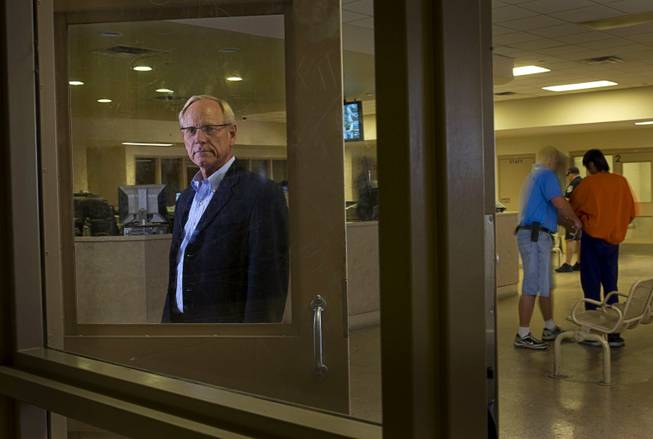
Fritz Reese, director of Clark County Juvenile Justice Services, poses in the booking area at the Clark County Juvenile Detention Center on Wednesday, May 25, 2011.
Monday, May 30, 2011 | 1:55 a.m.
Sun Archives
- Faced with budget cuts, County Commission weighs property tax hike (5-16-2011)
- DA refuses county’s call for 9 percent budget cut (4-7-2011)
- On split vote, county commissioners take 2 percent pay cut (3-15-2011)
- Budget cuts threaten Family Services lifeline (3-6-2011)
- County prepares smaller budget that could leave 400 jobless (3-1-2011)
- Commissioners: Budget puts unfair burden on 900,000 county residents (2-26-2011)
- Gov. Brian Sandoval’s budget means job, service cuts for Clark County (1-26-2011)
Sun Coverage
With severe state budget cuts looming, the best many Clark County juvenile probation officers can hope for beginning in July is to have caseloads 50 percent above national standards.
It could get worse than heavier caseloads for the cash-strapped county if it is also required by legislators to help finance the state’s supervision of youthful offenders in correctional or mental health facilities or alternative programs. And there’s also the chance, albeit slight, that the county will be without adequate funding to run the Spring Mountain Youth Camp for lower-level offenders or provide treatment for juveniles with mental health issues.
As the Legislature approaches its June 6 closing with many budget issues still not resolved, two nervous spectators are Fritz Reese, director of the county’s Juvenile Justice Services, and Family Court Judge William Voy, who presides over cases involving juvenile offenders. Both fear proposed cuts will stretch manpower thin, making it difficult to supervise, treat or counsel offenders.
“I’m always concerned about every cut,” Reese said. “Every cut is a blow, but our staff understands that we have to work through this.”
When Gov. Brian Sandoval proposed balancing the state’s budget without raising taxes, the county’s juvenile justice programs were to lose more than $7.1 million over the next two years. The governor and the Nevada Child and Family Services Division have since agreed to add back $4.6 million. That funding would help place 287 troubled youths in Medicaid-funded residential facilities to receive mental health or sex offender treatment and allow the county to continue operating the 100-bed Spring Mountain Youth Camp for youths who committed low-level offenses such as property crimes or drug use.
But that still leaves $2.5 million in cuts to key county juvenile justice programs. Those cuts include:
• $1.2 million from the Continuum of Care and Family Empowerment programs, which provide intensive supervision to help keep certain offenders with their families or in group homes instead of in detention. Continuum of Care, the larger program, serves 175 youths. Over the past four years these programs, which include family involvement, have helped reduce the rate of offenders committed to state facilities by 36 percent. The cuts would eliminate five full-time probation officers, two full-time mental health clinicians and four part-time employees.
• $756,000 to help the county supervise youths committed to the Clark County Juvenile Detention Center. Last year 354 Nevada youth parolees were detained in the facility. The cuts would eliminate five full-time probation officers.
• $487,000 to operate the Aftercare Program, which provides six months of intensive supervision to offenders after they have been released from Spring Mountain Youth Camp. The program, which serves more than 200 youths annually such as making sure they are attending school, has helped keep 88 percent of them from committing new crimes. The cuts would eliminate two full-time probation officers and one full-time clinician.
• $107,400 to provide evaluation and treatment for juvenile sex offenders.
Reese said he’s cautiously optimistic the Legislature will approve the money the governor has agreed to add back, but that optimism doesn’t extend to the remaining cuts.
If those reductions are approved, Reese said county juvenile probation officers will each average 60 to 65 lower-level offenders to supervise, far above the 45-to-1 ratio he said is a national standard and above the 55-to-1 ratio they have now.
“It creates a lot more work for the officers, so it reduces the amount of time they can spend with the youths and their families,” he said.
And Voy said: “Our juvenile probation officers are stretched as it is.”
Because many offenders come from homes where parental supervision is poor, Voy said the proposed cuts make it more likely that juveniles will end up in detention.
“When you cut juvenile services it also has direct impact on public safety,” he said.
If legislators reject the governor’s intention to add back $4.6 million, which is possible, the potential damage to the county would be far worse, Voy said. It would mean certain offenders with mental health problems who live in the community could be forced into detention. It would also threaten the future of Spring Mountain Youth Camp, raising the possibility lesser offenders would be sent to state youth camps in Elko and Caliente that house more violent juveniles.
“It also would increase the possibility of kids being transferred into the adult system,” Voy said. “They’ll end up worse off coming out than when they went in.”
He said that in 2009 the district attorney’s office asked him to transfer 57 juvenile offenders to adult detention facilities. Last year, when the state closed the maximum-security Summit View Youth Correctional Center to save money, Voy received 90 requests to transfer youths to adult facilities.
It’s possible the county will also have to spend $4 million in each of the next two years if lawmakers pass Senate Bill 476, which would require the county to support the state’s Youth Parole Bureau, which supervises offenders in state facilities and provides counseling and other aftercare services once they are released.
Health and Human Services Department spokeswoman Mary Woods, whose agency oversees juvenile justice programs, said the state budget is in such flux it is too early to predict what the effect on the county will be if SB476 is approved and state funding is reduced.
But county spokesman Erik Pappa has said it faces a projected $105 million deficit heading into the fiscal year beginning July, a figure that doesn’t include the $250 million in lost revenue to the state and an increase in unfunded state mandates.
Reese said he doesn’t know how the county would come up with the money SB476 would require.
“The county does a good job of funding us but our budget is tight,” Reese said. “We don’t have the money in our budget to come up with that $4 million a year to absorb those services.”



Join the Discussion:
Check this out for a full explanation of our conversion to the LiveFyre commenting system and instructions on how to sign up for an account.
Full comments policy